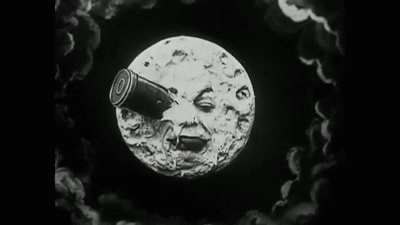BROKEN KNOWLEDGE (1)
By:
October 2, 2025

University of Toronto philosopher Mark Kingwell and HILOBROW‘s Josh Glenn are coauthors of The Idler’s Glossary (2008), The Wage Slave’s Glossary (2011), and The Adventurer’s Glossary (2021). In 2022, they engaged in an epistolary exchange about science fiction. Via the series BROKEN KNOWLEDGE, the title of which references Francis Bacon’s philosophy, HILOBROW is pleased to share a lightly edited version of their exchange with our readers. Also see Josh and Mark’s previous exchange 49th PARALLEL.
BROKEN KNOWLEDGE: FIRST CONTACT | WHAT IF? | A HYBRID GENRE | COUNTERFACTUALS | A HOT DILUTE SOUP | I’M A CYBORG | APOPHENIC-CURIOUS | AN AESTHETICS OF DIRT | PAGING DR. KRISTEVA | POLICING THE GENRE | FAMILIAR STRANGENESS | GAME OVER | THE WORLD VIEWED | DEFAMILIARIZATION | SINGULAR CREATURES | ALIEN ARCHAEOLOGIST | THE PHENOMENOLOGY OF SCREEN-TIME | HOMO SUPERIOR | EVERYTHING IS US.

7th September, 2022
BOSTON
Hi Mark,
I very much enjoyed our 2019 epistolary exchange — about adventure stories, movies, tropes, and language — some of which was quoted in, or which merely informed, our collaborative work on The Adventurer’s Glossary. Although I enjoy simply hanging around with you, too, because you are excellent company, I’ve really valued our intellectual exchanges since we first connected (after I wrote you a fan letter, I think) twenty-five years ago. I’m thrilled that you’re up for another rambling yet in-depth discussion… this time around, about science fiction. Hooray!
My interest in the genre was that of a fan — as an adolescent, I devoured Dune and Kirby’s Fourth World comics, Star Trek reruns and Bowie’s Ziggy Stardust; as an adult I discovered Dick, Butler, Le Guin, Delaney, Pynchon, Gibson, Banks — until 2008, when our mutual friends Annalee Newitz and Charlie Jane Anders invited me to write about (what I then called) “pre-Golden Age” sf for Gawker’s io9 website. I fell down a rabbit hole from which I’ve never emerged, and now find myself editing the MIT Press’s series of reissued Radium Age (c. 1900–1935) “proto-sf” novels and stories. Although I wouldn’t call myself an sf historian or scholar, exactly, the genre has consumed me.
Can we start off by talking about our earliest exposure to sf, and why we enjoyed it? For my part, I know that I was into sf before Star Wars and Close Encounters came out in 1977 (when I was turning ten). So I think my earliest exposure must have been – as mentioned already — DC and Marvel comics, Star Trek re-runs, maybe Jerome Beatty’s Matthew Looney books (with amazing illustrations by Gahan Wilson). I was vaguely aware of The Six Million Dollar Man but didn’t ever get to watch it, really.
I’m not sure I distinguished between these sf entertainments and my then-favorite genre, fantasy. I don’t think I considered any of these comics or TV shows as depicting a remotely plausible future. But as I cast my memory back, I do recall being stunned by the big reveal at the end of Suzanne Martel’s The City Under Ground — a 1975 book, by a Canadian author, that I found on my older cousin’s bookshelf. Its plot is more or less the same as that of the City of Ember series, as I recall. A futuristic society underground has forgotten that they’ve retreated there from the Earth’s surface… where civilization has devolved. It’s Plato’s allegory of the cave, only the cave-dwellers actually escape from their confinement — and then must struggle to reconcile two competing notions of reality. I’ve come across this theme fairly often since then — one thinks of Logan’s Run — but my point is that something about this sf book really captured my imagination in a way that fantasy couldn’t. A fantastical extrapolation of our own present moment? Tell me more!
What was your “first contact” with sf?
Josh
ALSO SEE: Josh’s BEST 250 ADVENTURES of the 20th CENTURY list | Mark on BATTLESTAR GALACTICA and THE HONG KONG CAVALIERS | Mark and Josh’s exchange 49th PARALLEL.
